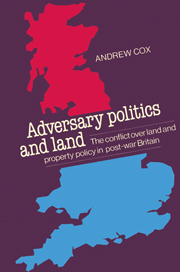Book contents
- Frontmatter
- Contents
- Preface
- PART A INTRODUCTION
- PART B THE PROBLEM OF LAND AND PROPERTY IN BRITAIN AND THE EFFECTIVE LIMITS ON GOVERNMENT POLICY INITIATION
- PART C THE HISTORY OF ADVERSARIAL POLICY FAILURE IN LAND AND PROPERTY IN POST-WAR BRITAIN
- 4 Labour, the 1947 system and the collapse of the development market (1945—1951)
- 5 The Conservative free market approach and the 1950s property boom (1951—1964)
- 6 Labour, the Land Commission and the problems of implementation (1964–1970)
- 7 The second failure of the Conservative free market approach and the 1970s property boom (1970–1974)
- 8 Labour and the failure of the Community Land Act (1974–1979)
- PART D CONCLUSION
- Notes
- Index
4 - Labour, the 1947 system and the collapse of the development market (1945—1951)
Published online by Cambridge University Press: 29 September 2009
- Frontmatter
- Contents
- Preface
- PART A INTRODUCTION
- PART B THE PROBLEM OF LAND AND PROPERTY IN BRITAIN AND THE EFFECTIVE LIMITS ON GOVERNMENT POLICY INITIATION
- PART C THE HISTORY OF ADVERSARIAL POLICY FAILURE IN LAND AND PROPERTY IN POST-WAR BRITAIN
- 4 Labour, the 1947 system and the collapse of the development market (1945—1951)
- 5 The Conservative free market approach and the 1950s property boom (1951—1964)
- 6 Labour, the Land Commission and the problems of implementation (1964–1970)
- 7 The second failure of the Conservative free market approach and the 1970s property boom (1970–1974)
- 8 Labour and the failure of the Community Land Act (1974–1979)
- PART D CONCLUSION
- Notes
- Index
Summary
Land values policies, Uthwatt and the powers of initiation and constraint. The power of initiation: the Labour government and the 1947 Town and Country Planning Act. The power of constraint: the collapse of the development market and the failure of the 1947 Town and Country Planning Act.
Land values policies, Uthwatt and the powers of initiation and constraint
It was argued that the wartime Coalition government was pressurised from three broad directions over land policy. Firstly, there was the demand that the state's role should be limited to the collection of betterment and the regulation of land use planning, with full compensation at market rates for landowners whose land was purchased by the state. Secondly, came proposals that betterment should be collected on a wider basis, and that this should be used to finance a positive, facilitative state land supply and development role. Finally, there were those who proposed land nationalisation and limited compensation to landowners. The Uthwatt Committee's proposals were within the second of these broad approaches but they were not accepted fully by the government. Furthermore, even if this policy had been initiated it is likely that it would have failed in implementation, due to the power of constraint held by bureaucratic and social and economic interests outside the policy initiation process.
The main obstacles against either land nationalisation or the Uthwatt Committee's approach are the possibility of a development strike and the financial constraint of the state having to purchase all land for development and expend public resources in the process of development and redevelopment. The Uthwatt Committee's approach went too far because of failure to recognise these powers of constraint.
- Type
- Chapter
- Information
- Adversary Politics and LandThe Conflict Over Land and Property Policy in Post-War Britain, pp. 77 - 102Publisher: Cambridge University PressPrint publication year: 1984



